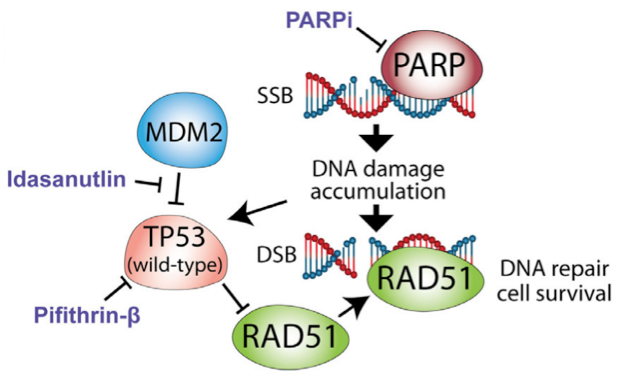TP53 proficient colorectal cancer cells are sensitive to PARP inhibition

By examining vulnerabilities in colorectal cancer, Jørgen Smeby, Kushtrim Kryeziu, and colleagues demonstrated the efficacy of PARP inhibitors for a subgroup of colorectal cancer cell lines in a recent paper in EBioMedicine (The Lancet’s open access).
Poly ADP ribose polymerase (PARP) is one of the principal players that assist in maintaining genome integrity. Targeting this protein became a successful strategy in the treatment of some types of breast and ovarian cancer. PARP inhibitors induce synthetic lethality via inhibition of DNA single-strand break repair mechanisms and are particularly active in tumors with a homologous recombination deficiency (HRD). The authors show that patients with advanced colorectal cancer and a high HRD score based on DNA copy numbers in their primary tumors have inferior overall survival. Nevertheless, HRD genomic and transcriptomic signatures that predict PARP inhibitor sensitivity in breast and ovarian cancers were not similarly predictive in the 93 analyzed colorectal cancer cell models. Instead, the efficacy of PARP inhibition was found to associate with wild type TP53 status. Furthermore, wild-type TP53-mediated suppression of DNA repairing enzyme RAD51 was identified as a possible mechanism of action for sensitivity to PARP inhibition (figure).

The study was supervised by project group leader Anita Sveen in the Lothe lab., and was performed by a multidisciplinary team at the K.G.Jebsen Colorectal Cancer Research Centre.
The research paper:
Molecular correlates of sensitivity to PARP inhibition beyond homologous recombination deficiency in pre-clinical models of colorectal cancer point to wild-type TP53 activity.
Jørgen Smeby, Kushtrim Kryeziu, Kaja C. G. Berg, Ina A. Eilertsen, Peter W. Eide, Bjarne Johannessen, Marianne G. Guren, Arild Nesbakken, Jarle Bruun, Ragnhild A. Lothe, Anita Sveen. EBioMedicine. 2020 Aug 13;59:102923. doi: 10.1016/j.ebiom.2020.102923
Links:
